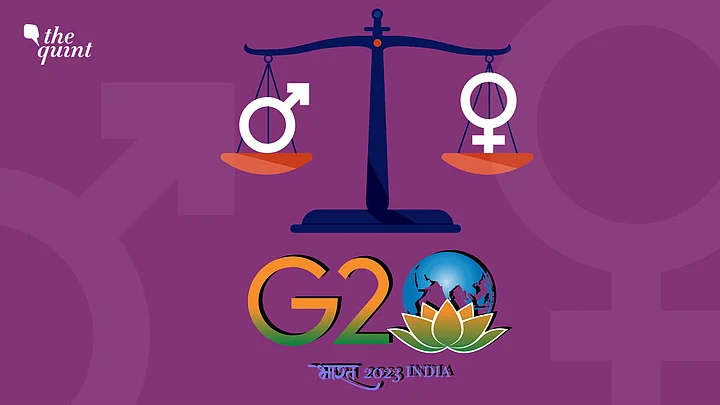Gender equality is a condition for achieving the Sustainable Development Goals. But they will remain out of reach when countries are too scared to legalise people of all genders when religious dogma does not permit everyone to live freely, and when gender issues are not ‘prioritised’ over other problems, often perceived as bigger or more urgent.
‘Leave no one behind’ is the central, transformative promise of the 2030 Agenda for Sustainable Development – but the current reality is that we are leaving too many behind to be heard at all.
We call on G20 countries to push uncomfortable boundaries and make progress on eradicating gender-based violence and legalising all forms of gender identity, expression, and sexual orientation.
To achieve the Sustainable Development Goals (SDGs), gender equality is both a goal and a condition of success. Still, none of the G20 nations in the Global South as well as the Global North, are on track to achieve it by 2030.
In fact, the G20 is unable to achieve any SDGs when all G20 countries, aside from Mexico and South Africa, have at least one law that treats men and women differently. Gender inequality exists in every country, taking different forms depending on its cultural context.
Where gender-related issues challenge longstanding norms in development, they tend to be downplayed and even ignored.
Caveats Towards Raising The Gender Issue
Our international team of science-to-policy researchers at Stockholm Environment Institute recently presented five pathways for the G20 to address underlying systemic and deeply embedded drivers of gender inequality.
There were recommendations we wanted to make but could not. If we wanted to be heard by the G20, we needed to take off some edges.
We were discouraged from explicitly calling for the legalisation of some gender identities, expressions, and orientations – as that would make it hard for us to get our research published.
Even though a central purpose of the policy brief was to present actionable knowledge to ‘leave no one behind’, we had to leave many behind to be able to be heard at all.
Laws Around Gender and Sexuality Remain Skewed
Achieving gender equality is critical: it tends to reduce poverty, improves health for all, including children, strengthens the economy, reduces human trafficking, correlates with peace or the level of democracy, and even saves lives in crises.
While the concepts and lived reality of gender and sexuality are evolving, the world is stuck in old gender and sex norms leaving millions of people behind. These unchanging norms have devastating consequences around the globe and in G20 countries.
For instance, Homosexuality is punishable in Saudi Arabia. In most countries, transgender and non-binary people struggle to access public sanitation services.
Almost one in three women in the UK is a victim of physical and/or sexual intimate partner violence in her lifetime. In three G20 nations – Brazil, Mexico, and India – over 15% and even 20% of girls between 15 and 19 had been or were still married, divorced, widowed, or in an informal union in 2019.
Gender-based violence incidence rates are much higher for gender minorities, and these numbers cannot be ignored when being intersex is about as common as having red hair and around 5% of young people say their gender differs from their sex assigned at birth.
The most uncomfortable issues to discuss are those that challenge norms and involve legislation considered too complex to achieve.
A Shared Focus on All Aspects of Inequality Is Imperative
We continue to focus much more on understanding interventions for issues such as gender pay gaps and unequal care work than on how nations decriminalise people with diverse sexual orientations, gender identities and expressions.
Property rights and ownership take precedence over strengthening legal mechanisms to prosecute acts of gender-based violence.
Without expanding our definition of gender equality and addressing complex problems that plague the spectrum, the SDGs will not be achieved for all, and the effectiveness of other gains will be hugely undermined.
Even though these topics can be immensely complicated and context-specific, it should not stop us from trying.
Gender justice includes all genders, everywhere. Our understanding of gender is changing, and we need to embrace its complexity and challenge our norms, as the fear to go deeper limits progress towards equality.
Hence, based on our research and policy recommendations, we urge the G20 countries to embrace the uncomfortable.
We call for four actions, across countries and scales, to push these ‘uncomfortable boundaries’ depending on the country's context:
Operationalise international commitments (eg, CEDAW), including land rights and eradicating gender-based violence in G20 nations.
Leverage legal and programmatic options to end gender-based violence.
Invest in understanding how countries legalise all forms of gender identity, expression, and sexual orientation.
Pressurise countries to make progress on all of the above stated areas in international, high-level forums.
When Can a Comprehensive Solution Be Sighted?
In recent years, gender inequality not only persists in G20 countries but worldwide. Multiple crises have put additional stress on countries and their infrastructure, revealing and amplifying underlying systemic factors and drivers of inequity. None of the G20 countries is on track to achieve the Sustainable Development Goals by 2030.
Gender equality at the current rate of progress will take almost 300 years to achieve. We are convinced they can do better. Our children and grandchildren deserve a more just world, and they need us to try harder.
(Laura Del Duca, Research Associate at Stockholm Environment Institute (SEI) and part of SEI’s global Initiative on Gender Equality, Social Equity and Poverty. This is an opinion article and the views expressed are the author’s own. The Quint neither endorses nor is responsible for them.)
(At The Quint, we question everything. Play an active role in shaping our journalism by becoming a member today.)
